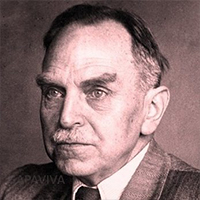Otto Hahn
Otto Hahn was a German chemist, and a pioneer in the fields of radioactivity and radiochemistry. Hahn is referred to as the father of nuclear chemistry. Hahn and Lise Meitner discovered radioactive isotopes of radium, thorium, protactinium and uranium
He studied chemistry at Marburg and Munich and received his Ph.D. from the former in 1901, submitting a thesis on organic chemistry. Hahn worked initially at the Chemical Institute at Marburg, then moved to University College in London in 1904, on to the Physical Institute of McGill University in Montreal in 1905, and then to the Chemical Institute of the University of Berlin in 1906. In the spring of 1907, he qualified as a university lecturer and also discovered mesothorium.
Along with Lise Meitner began more than 30 years’ collaboration. Their joint work embraced investigations on beta-rays and the use of the radioactive recoil to obtain new radioactive transformation products. They discovered protactinium, the long-lived mother substance of the actinium series. Hahn further discovered uranium Z, the first case of a nuclear isomerism of radioactive kinds of atoms. He also collaborated with Meitner and Fritz Strassmann on the processes if irradiating uranium and thorium with neutrons.
Hahn and Meitner also worked together on the discovery of an artificially active uranium isotope, which represents the basic substance of the elements neptunium and plutonium, first revealed later in America. But his most spectacular discovery came at the end of 1938 when, while working jointly with Strassmann, Hahn discovered the fission of uranium. This discovery earned Hahn the Nobel Prize in Chemistry in 1944, and led directly to the development of the atomic bomb.

Otto Hahn
Date of Birth: 08 Mar 1879
Birth Place: Frankfurt, Germany
Proffession: German chemist
Nationality: German
Death: 28 July 1968, Göttingen, Germany


